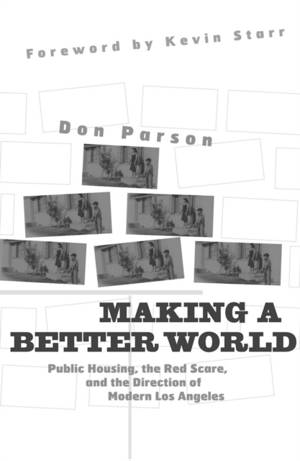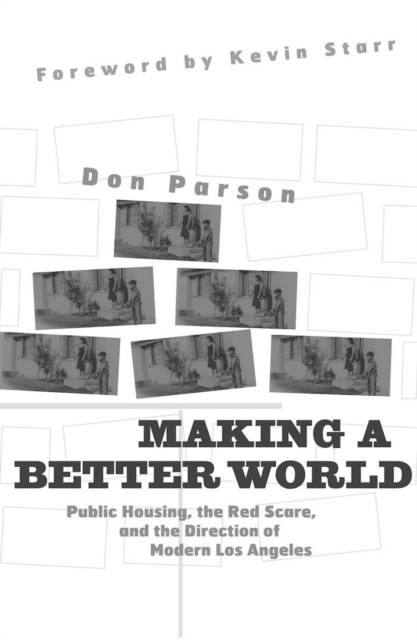
Bedankt voor het vertrouwen het afgelopen jaar! Om jou te bedanken bieden we GRATIS verzending (in België) aan op alles gedurende de hele maand januari.
- Afhalen na 1 uur in een winkel met voorraad
- In januari gratis thuislevering in België
- Ruim aanbod met 7 miljoen producten
Bedankt voor het vertrouwen het afgelopen jaar! Om jou te bedanken bieden we GRATIS verzending (in België) aan op alles gedurende de hele maand januari.
- Afhalen na 1 uur in een winkel met voorraad
- In januari gratis thuislevering in België
- Ruim aanbod met 7 miljoen producten
Zoeken
Making a Better World
Public Housing, the Red Scare, and the Direction of Modern Los Angeles
Don Parson
Hardcover | Engels
€ 81,45
+ 162 punten
Omschrijving
During the 1990s, Los Angeles - like many other cities across America - began demolishing public housing projects that had come to symbolize decades of failed urban policies. But public housing was not always regarded with such disdain. In the years surrounding World War II, it had been a popular New Deal program, viewed as a force for positive social change and supported by a broad coalition of civic, labor, religious, and community organizations. Socially conscious architects and planners developed innovative and livable projects that embodied the latest theories in urban design. With sharp historical perspective, Making a Better World traces the rise and fall of a public housing ethic in Los Angeles and its impact on the city's built environment. In the caustic political atmosphere of Joseph McCarthy's America, public housing opponents accused the city's housing authority of communist infiltration, effectively eliminating the left from debates over the city's development. In place of public housing, conservative forces promoted a pro-private growth agenda that redefined urban renewal and reshaped modern Los Angeles. No conventional public housing projects have been constructed in Los Angeles since 1955. In this era of skyrocketing housing prices, especially in urban areas, Don Parson's examination not only gives us the recent history of a city, but also opens up a new debate on a current national crisis in providing shelter for low-income Americans.
Specificaties
Betrokkenen
- Auteur(s):
- Uitgeverij:
Inhoud
- Aantal bladzijden:
- 289
- Taal:
- Engels
Eigenschappen
- Productcode (EAN):
- 9780816643691
- Verschijningsdatum:
- 20/09/2005
- Uitvoering:
- Hardcover
- Formaat:
- Genaaid
- Afmetingen:
- 156 mm x 237 mm
- Gewicht:
- 571 g

Alleen bij Standaard Boekhandel
+ 162 punten op je klantenkaart van Standaard Boekhandel
Beoordelingen
We publiceren alleen reviews die voldoen aan de voorwaarden voor reviews. Bekijk onze voorwaarden voor reviews.









